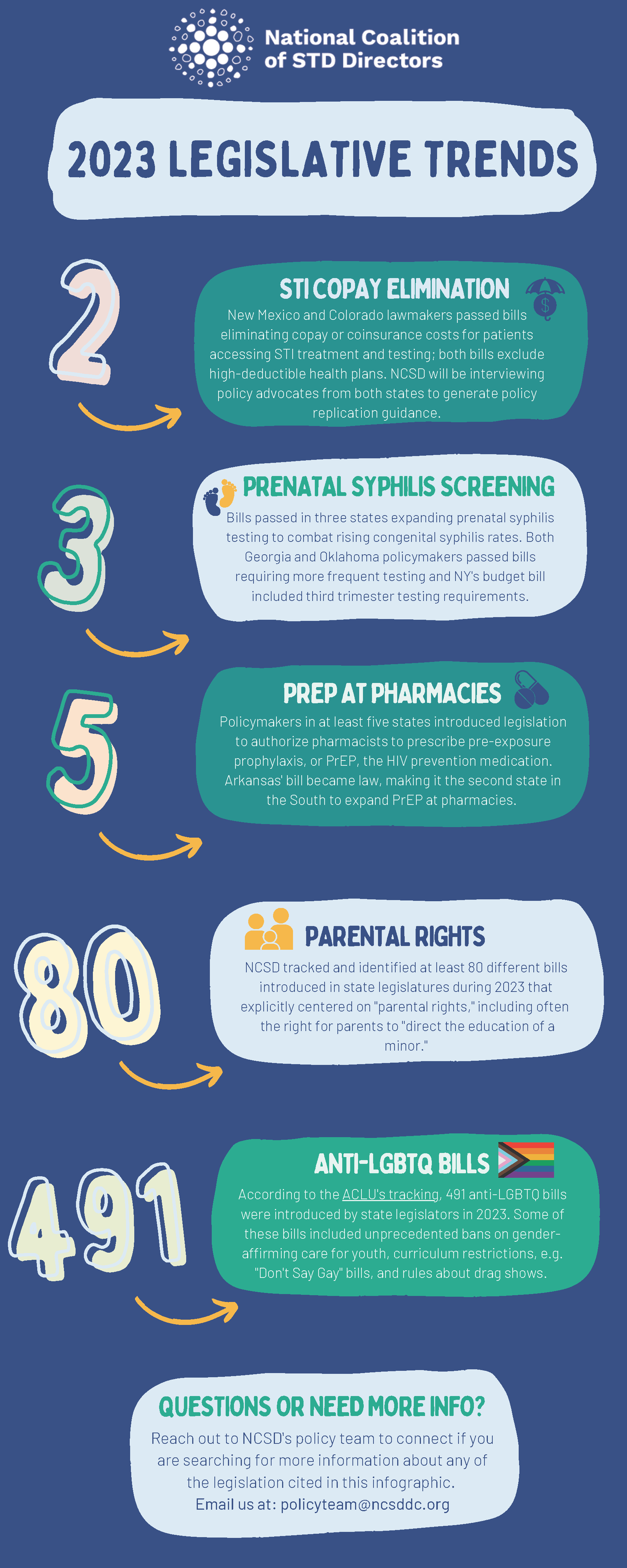This Month in State Policy – May & June, 2023
Highlights from key sexual health policies across state legislatures.

This Month in State Policy
NCSD’s This Month in State Policy is a corresponding series intended to complement state-specific policies outlined regularly in This Week in Congress. NSCD will post This Month in State Policy through early June to provide peak coverage and analysis of state legislative sessions. For more information about this summary or other state policy trends, please contact NCSD’s Policy Team.
Minor Consent to Preventative Services:
State Sen. Dallas Harris (D-Nev.) introduced legislation that was ultimately approved by the state’s Democrat-controlled legislature to ensure minors under age 18 can legally consent to HIV, STI, and pregnancy prevention services without parental or guardian permission. Nevada Governor Joe Lombardo (R) signed the bill into law on June 5. As defined in the bill, preventative services can include drug administration or devices, such as contraceptives, condoms, HPV vaccines, and pre-exposure prophylaxis, or PrEP. Nevada state law currently permits minors to receive STI examination and treatment without parental consent; SB172 intends to offer more consistency across health needs by including other services explicitly. Responses to the legislation revolved around “minor rights vs. parental rights” debates, which have continued to permeate political discourse across state legislative sessions this year.
Prenatal Syphilis Screening:
In early May, Governor Kathy Hochul (D-NY) signed the state’s FY23 executive budget bill into law, which included an expansion in prenatal syphilis screening by mandating pregnant persons are tested during their third trimester. The legislative victory was the culmination of a five-year long effort between state health partners and legislators to tackle congenital syphilis by applying the state’s Ending the Epidemic policy strategies, which address both the HIV epidemic and concurrent syndemics. During this time period, congenital syphilis rates increased by 51% in New York, creating a sense of urgency that helped facilitate its passage. Gov. Hochul included the expansion in her proposed budget earlier in the year and it passed both chambers in consensus with the governor’s agenda.
New York’s umbilical cord blood test regulation under Family Health Section 69-2.2 requires serological testing of an infant’s umbilical cord for syphilis after 22 weeks gestation and is waived at delivery if body blood was tested and came back positive. The budget bill expands upon this existing rule by applying language more broadly and includes the requirement under public health law.
STI Screenings and HIV Equity:
Illinois lawmakers also used their upcoming fiscal year appropriations to enact new STI policy within the state budget. SB250, passed by Illinois policymakers at the end of session in June, allocated $5.28 million in new sexual health-related funding, including $500,000 for grants and administrative expenses for STI screenings. The funding approved by Illinois lawmakers is the first time the state leveraged general revenue funds to earmark STI-related funding. In addition to expanding fiscal support for STI screenings, the final package included several other provisions, such as $2.78 million in new funding to address racial disparities in HIV services for the Black community, as well as other communities of color (sometimes referred to as BIPOC, or Black, Indigenous, and People of Color). This funding augments the African-American AIDS Response Act, which issues Notices of Funding Opportunities (NOFOs) to ensure BIPOC-led, BIPOC-serving organizations help reduce the HIV and STI crises disproportionately affecting their communities through culturally responsive tactics.
PrEP Access:
In 2023, several state legislatures explored opportunities to strengthen HIV prevention infrastructure. Most recently, Rhode Island State Senator Melissa Murray (D) introduced a bill (S563) that would require PrEP and post-exposure prophylaxis (PEP) insurance coverage. S563 would limit the use of any prior authorization or step therapy requirements for PrEP, as long as the health insurance carrier covers at least one approved drug for each method of administration. This specific language could theoretically protect coverage for newer PrEP modalities beyond the daily oral pill that have been approved by the FDA or could be in the future, such as long-acting injectable medication or vaginal rings. Language added to the bill clarified that “each long-acting injectable drug with a different duration shall constitute a separate method of administration,” ensuring insurance carriers differentiate injectables under their coverage requirements when dose administration schedules vary. The bill was approved by both Democrat-controlled chambers and was signed by Governor Daniel McKee (D) on June 22.
Summary of State Legislative Sessions – By the Numbers
NCSD will continue to publish This Month in State Policy throughout the year as states in regular or special session enact relevant sexual health policies. However, because many state legislatures break for the year by June 30, this month’s post will serve as a reflective summary of 2023 policy trends. This includes NCSD’s “by the numbers” tally of relevant and important sexual health legislative patterns that occurred throughout the year. Please review the image below for details.
